Disability Support Coordinator: Your Guide to NDIS Success
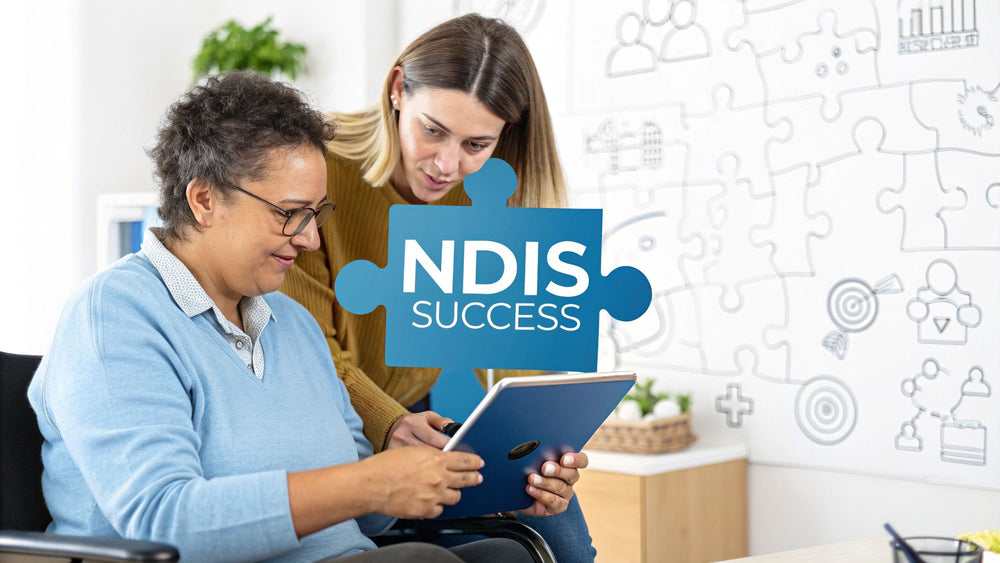
If you've ever felt overwhelmed by your NDIS plan, you're not alone. Think of a disability support coordinator as the expert guide who helps you turn that plan from a confusing document into a real-world strategy for your life. They're your personal project manager for all things NDIS.
Your Expert Guide to Navigating the NDIS
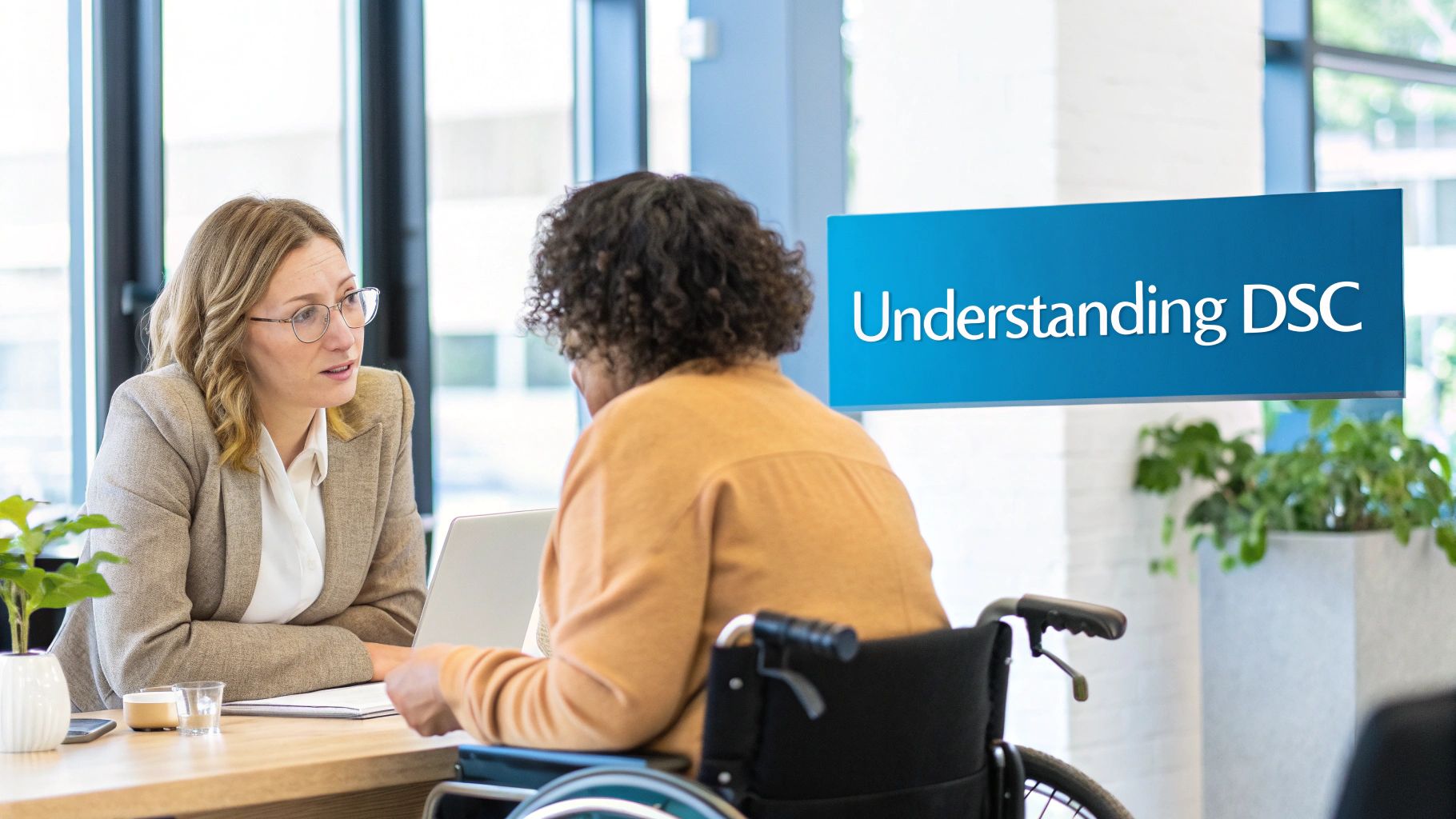
Trying to make sense of the National Disability Insurance Scheme (NDIS) can sometimes feel like you've been handed a map to a city you've never visited, written in a language you don't quite understand. You know where you want to go—your goals—but figuring out the route can be tough.
This is exactly where a disability support coordinator shines. Their entire job is to help you understand your NDIS plan, put it into action, and squeeze every last drop of value from your funding. They become your trusted ally, connecting the dots between your plan's budget and the actual services that will make a tangible difference in your daily life.
What Does a Coordinator Actually Do?
A great coordinator does so much more than just shuffle paperwork. They are focused on empowering you, working with you to build your own skills and confidence so you can take control of your supports.
Here’s a snapshot of what they handle:
- Making Sense of Your Plan: They'll sit down with you and break down all the different support categories and budgets, making it crystal clear what funding you have and how you can use it.
- Finding the Right People: They do the legwork of researching and vetting high-quality, local service providers—from occupational therapists to community hobby groups—that are a perfect fit for your goals.
- Building Your Independence: A key part of their role is to help you develop the skills to manage your own supports over time. The goal is always to foster your independence.
- Solving Problems: When things don't go to plan with a provider, your coordinator is your first point of contact. They step in to resolve issues and ensure your supports continue to run smoothly.
A disability support coordinator is the glue that holds your entire support network together. They ensure you, your family, your providers, and the NDIA are all on the same page and working towards your goals.
Beyond Basic Support
The best coordinators don't just tick boxes. They get to know you and help you build a life that truly reflects your passions and interests. This could mean finding unique social groups, creative workshops, or specialised programs you might not have known existed.
For example, they can help you find and join programs specifically designed to forge new connections, which is a vital part of community participation. Our guide on inclusive activities to build social skills for people with disabilities delves into some fantastic local opportunities.
At the end of the day, a support coordinator is your strategic partner. They are completely dedicated to making sure your NDIS plan doesn't just collect dust, but becomes a living, breathing tool that helps you build the life you truly want.
Your Coordinator's Key Responsibilities
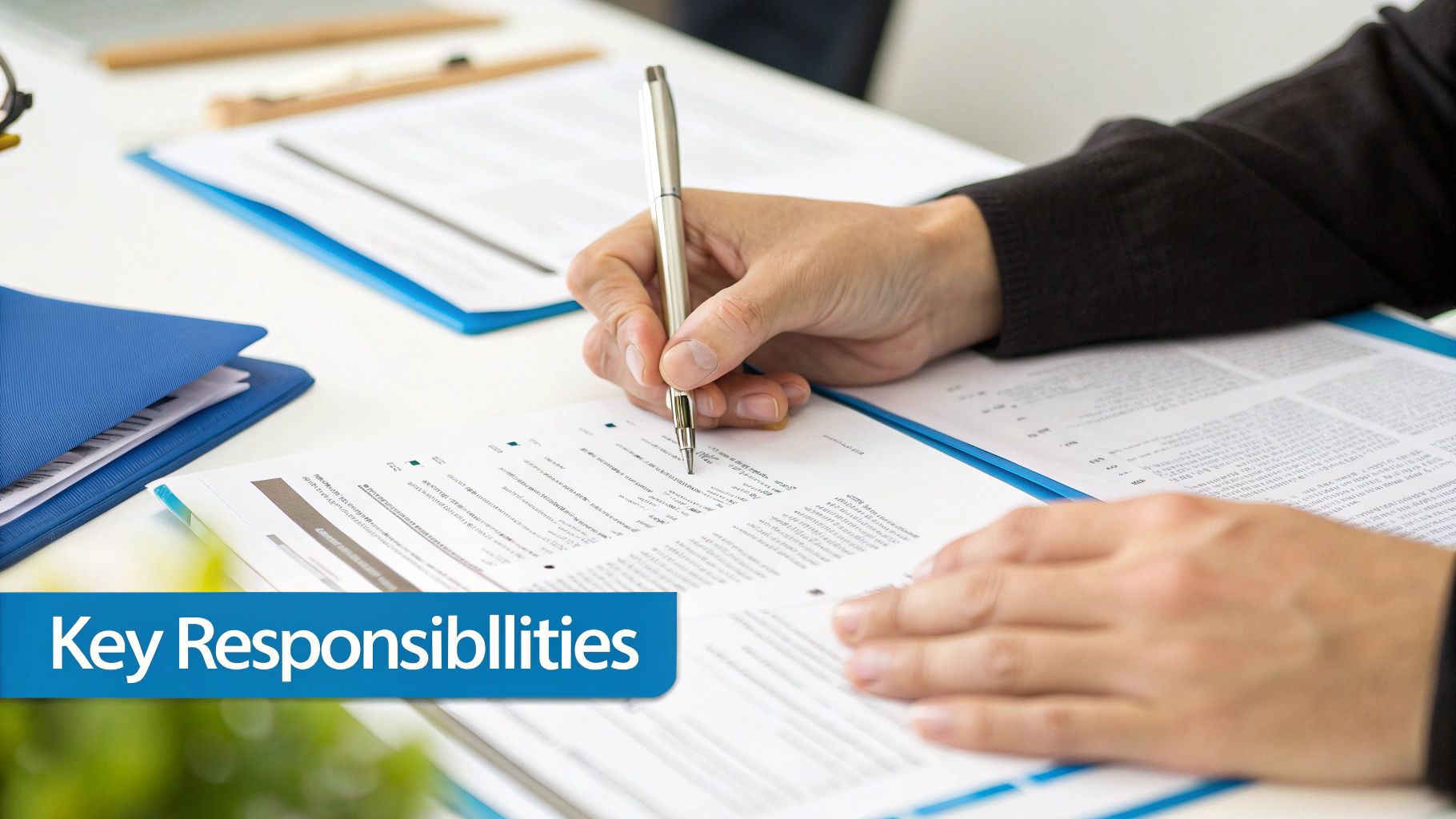
So, what does a support coordinator actually do? When you bring one onto your team, you're getting more than just an NDIS expert. You're getting a dedicated ally who handles the nitty-gritty details, freeing you up to focus on what truly matters: your goals.
Think of them as the project manager for your NDIS plan. They become the central point of contact between you, your therapists, support workers, and the NDIA. This ensures everyone is on the same page and working together, which is crucial for making your plan work effectively.
Understanding and Activating Your Plan
One of the first things a great coordinator does is help you make sense of your NDIS plan. Let's be honest, they can be confusing. Your coordinator will sit down with you and break it all down—explaining the different support categories, what the funding can be used for, and translating the jargon into plain English.
Once you’re clear on what your plan contains, it’s time to bring it to life. This is where their connections and expertise really shine. This process usually involves:
- Finding the Right Providers: They'll use their deep knowledge of local services to find providers who are a good fit for you—not just in the support they offer, but in their approach and personality.
- Making Connections: Your coordinator will handle the introductions, help set up initial meetings, and make sure you feel totally comfortable before locking anything in.
- Setting Up Service Agreements: They help formalise the arrangements with your chosen providers. This crucial step makes sure everyone is clear on what support will be delivered, how much it will cost, and when, which helps avoid any confusion down the track.
A core responsibility of your disability support coordinator is to build your capacity for choice and control. They empower you by providing the information and tools needed to make informed decisions about your own supports.
This role is more important than ever. The NDIS is a huge system, supported by a workforce of around 270,000 workers across over 11,600 providers back in 2021. With so many options, having a coordinator to help you navigate it all is a massive advantage. You can dive deeper into the NDIS National Workforce Plan to learn more about its projected growth and strategy.
Monitoring and Managing Your Supports
A coordinator’s work isn’t done once your supports are up and running. They stick with you for the long haul, making sure everything continues to run smoothly and adapt as your needs evolve.
This ongoing support involves a few key things:
- Keeping an Eye on Progress and Budgets: They will regularly check in to see how you're progressing towards your goals. They also keep a close watch on your NDIS budget to make sure your funding is being used wisely and will last the duration of your plan.
- Solving Problems: If you hit a snag with a provider or a service isn't working out, your coordinator is your first port of call. They’ll step in to advocate on your behalf and help find a solution.
- Getting Ready for Plan Reviews: As your plan review date gets closer, they become your preparation partner. They’ll help you collect the right reports and evidence from your providers to show how your supports have made a difference, ensuring you go into your review meeting feeling confident and prepared.
Getting the Most Value From Your NDIS Plan
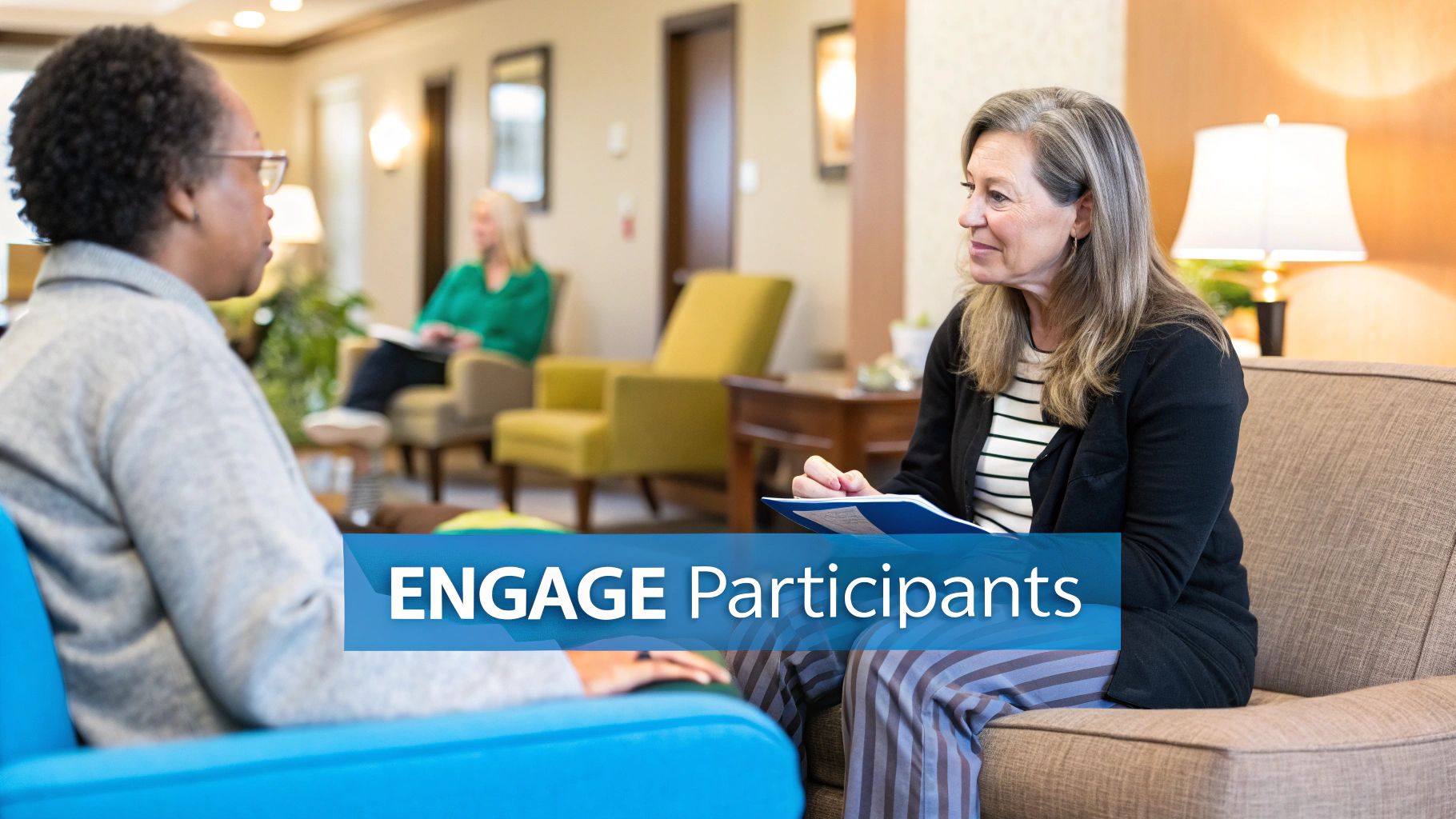
A fantastic disability support coordinator is much more than just an administrator for your plan. Think of them as a strategic partner, someone whose whole job is to unlock the full potential of your NDIS funding. They are committed to making sure every dollar works as hard as it can for you, often looking beyond the obvious to find creative and truly effective support solutions.
One of the biggest ways they add value is by building your own ability to manage your supports over time. A great coordinator doesn't just do things for you; they teach you how to do them. This could mean walking you through how to research providers, helping you get your head around service agreements, or giving you the confidence to speak up for your needs. The goal is always long-term independence.
This approach naturally leads to getting the best value for your money. Because they take the time to deeply understand your goals and know the local service landscape inside and out, they can connect you with providers who deliver exceptional quality and are the perfect fit for you. This prevents wasting precious funds on supports that just don't hit the mark.
Turning Plans Into Practical Action
The real magic of a coordinator happens when theory meets reality. They are the problem-solvers and navigators who step in to handle challenges that could otherwise feel completely overwhelming. This is where you see a tangible return on having them on your team.
Here are a few real-world situations where a coordinator proves their worth:
- Finding Niche Specialists: Let's say you need a therapist who not only specialises in a rare condition but also does in-home visits. Instead of you spending hours on frustrating searches, a coordinator taps into their professional network to find and connect you with that exact specialist.
- Negotiating Better Terms: When you're signing a service agreement, your coordinator can act as your advocate. They can negotiate for more favourable terms, like flexible appointment times or clearer communication channels, making sure the service is genuinely set up to work for you.
- Guiding You Through a Crisis: If an unexpected crisis hits—like a sudden hospital stay or a breakdown with a key support worker—your coordinator is your first point of call. They can act fast to arrange emergency supports and work with hospitals or other services to ensure you have continuity of care.
A proactive disability support coordinator is your advocate, safety net, and strategist all in one. They provide peace of mind by expertly managing the complexities of the NDIS, allowing you to focus on living your life.
Their role is absolutely central to building a seamless support system that flexes and adapts with your life. For a deeper dive into this vital role, feel free to explore our detailed guide on maximising your NDIS plan with support coordination.
Ultimately, a support coordinator helps turn your NDIS plan from a document full of numbers into a dynamic, practical tool for achieving what matters most to you. It's this dedicated partnership that makes them such an indispensable part of your team, ensuring your journey isn't just managed, but masterfully guided.
Understanding Different NDIS Support Roles
The NDIS world can feel crowded with different job titles, and it’s incredibly easy to get them mixed up. Knowing who does what is the key to building an effective support team and making sure you’re calling the right person for the right reason. A disability support coordinator has a very specific, crucial job that’s quite different from the other key players on your team.
Most of the time, the confusion boils down to a few main roles that sound similar but have vastly different functions. For instance, a Local Area Coordinator (LAC) is often your first point of contact—they help you get into the NDIS and create your initial plan. A Plan Manager, on the other hand, is your financial guru, handling all the invoices and payments from your NDIS funds. Then you have your Support Workers, who provide the direct, hands-on help laid out in your plan.
So where does a disability support coordinator fit in? Think of them as the strategic link between your plan’s goals and the actual services you use. They are the specialist who helps you put your plan into action, find the best providers for your unique needs, and troubleshoot any problems that pop up along the way.
This image here really captures the ongoing nature of their work—it’s a cycle of planning, connecting, and checking in to make sure everything is working for you.
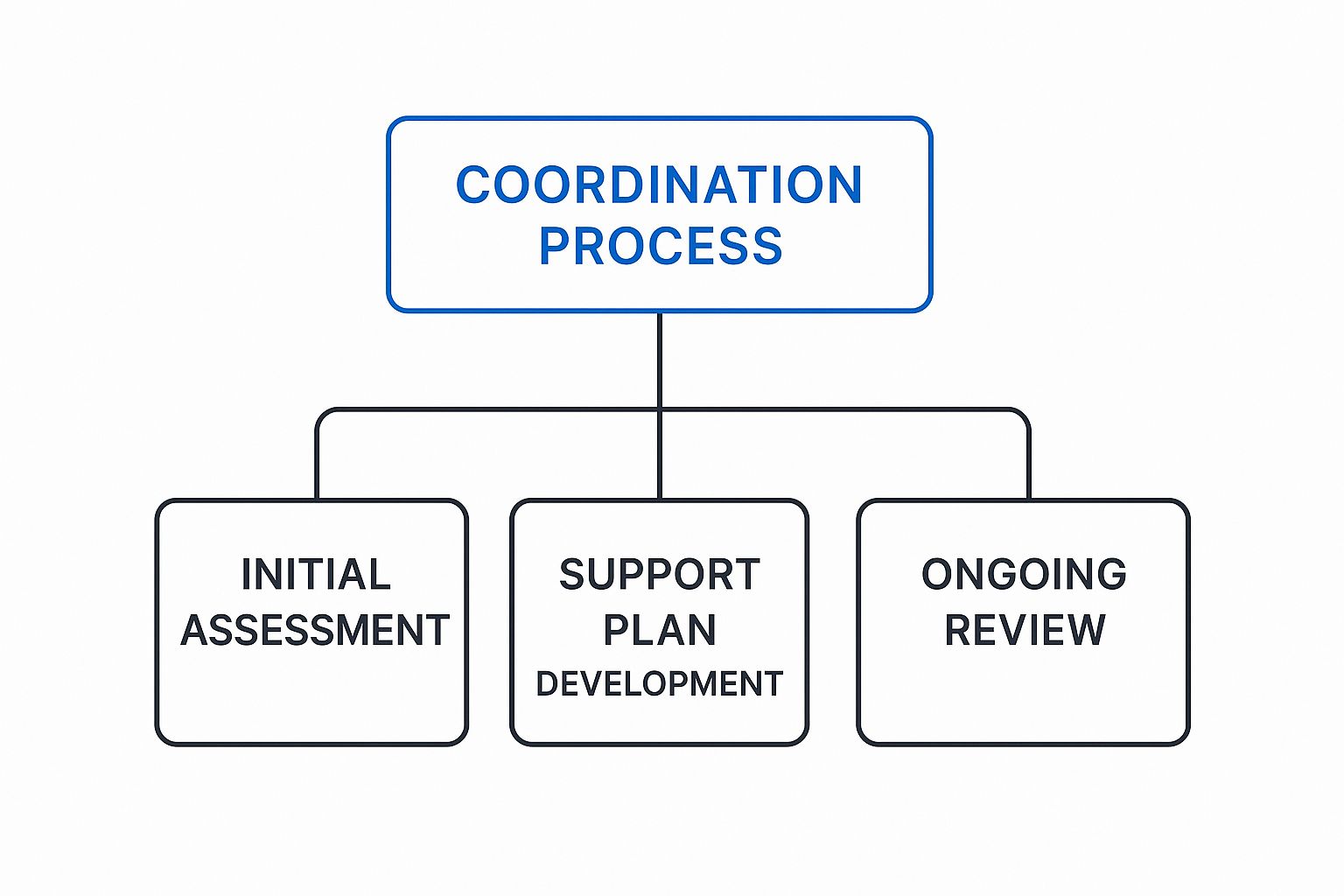
As you can see, their job isn't a one-off task. It’s a continuous loop of planning, acting, and refining to ensure your supports are always hitting the mark.
Key NDIS Roles At a Glance
To make this even clearer, it helps to see the main NDIS roles side-by-side. Knowing their primary function helps you understand who to turn to for specific issues.
Here’s a quick comparison table to help you keep track.
| Role | Primary Function | Who They Work For | Funded Under |
|---|---|---|---|
| Support Coordinator | Helps you implement your plan, connect with services, and build your capacity. | You (the NDIS Participant) | Capacity Building budget |
| Local Area Coordinator (LAC) | Helps you access the NDIS, create your first plan, and link to mainstream services. | The NDIA (as a partner in the community) | Not funded from your plan |
| Plan Manager | Manages the financial side of your plan, paying invoices and tracking spending. | You (if you choose plan management) | Capacity Building or Core Supports budget |
| Support Worker | Provides direct, hands-on support for daily tasks, access, and personal care. | You (or your chosen provider agency) | Core Supports or Capacity Building budgets |
This table makes it easier to see how each role contributes something different to your NDIS journey.
So, Who Do You Call?
Let's put this into a real-world context. Knowing who to contact saves you from being passed from person to person.
- Struggling to find a good physiotherapist who gets you? Your Support Coordinator is the person to call.
- Need to get an invoice paid for a service? That’s a job for your Plan Manager.
- Want to join a local art class or need help with grocery shopping? Your Support Worker can help you with that. If you're curious about this, you can learn more in our article on NDIS community participation.
- Have a friend who wants to apply for the NDIS for the first time? They should start by getting in touch with a Local Area Coordinator.
Understanding these distinctions is the first step toward building a smarter, more efficient support system. It empowers you to go directly to the right person, saving you time and reducing frustration.
By getting these roles straight in your head, you can ensure your entire NDIS team works together seamlessly. Everyone has their part to play in helping you achieve your goals, and this clarity is the foundation for taking true choice and control over your NDIS journey.
Finding the Right Disability Support Coordinator
Picking a disability support coordinator is a big deal. You aren't just ticking a box or choosing a service; you're finding a partner to help you navigate your entire NDIS journey. Finding someone who truly gets you, understands your goals, and communicates clearly can absolutely change the game.
It's about more than what's on their resume. It’s about feeling a real connection and a sense of trust. A brilliant coordinator will spend more time listening than talking, making sure they understand your unique hopes and hurdles before they even think about suggesting a solution. They become a true advocate, someone firmly in your corner.
The disability support sector in Australia is full of passionate people, and coordinators are the crucial link between participants and the services they need. The workforce is about two-thirds female, with 49% aged between 25 and 44, and 60% of workers are in permanent roles. A good coordinator knows how to work within this dynamic environment. You can dig into more stats about the disability services workforce on the Productivity Commission's website.
Key Questions to Ask Potential Coordinators
To find the right person, it pays to be prepared. Think of it as an interview, but you’re the one in charge.
Here are some of the most important questions you should ask:
- Experience: "Can you tell me about your experience supporting people with goals like mine?" This gets right to the point and shows if they're familiar with your specific situation.
- Local Knowledge: "Which local providers have you worked with and had good results for your clients?" Someone with solid local connections is an invaluable asset.
- Communication Style: "How often will we check in, and what's the best way to get in touch if I need you?" This sets expectations right from the beginning.
- Problem-Solving: "Could you share an example of a tricky situation you helped someone work through?" This gives you a real insight into how they handle challenges when things don't go to plan.
Finding the right coordinator isn't about finding the person with the longest CV. It's about finding the person who makes you feel heard, understood, and confident that they are 100% on your team.
Look For a Genuine Partnership
At the end of the day, the best disability support coordinator is someone who sees the whole you, not just your NDIS plan. They will work with you, not just for you, helping you build your own skills and confidence as you go.
For anyone in South Australia, the number of choices can feel a bit much. To make it easier, we've put together a detailed guide on choosing the right disability support in Adelaide with more local tips.
Don't rush this decision. Chat with a few different coordinators before you make your choice. A strong, trusting partnership is the key to unlocking the full potential of your NDIS plan and building the life you want.
How Coordinators Can Support Your Employment Goals
For many people on the NDIS, finding and keeping a meaningful job is a huge goal. It’s not just about earning an income; it’s about independence, purpose, and being part of the community. But let's be honest, the journey to employment can be tricky to navigate on your own.
This is where a great disability support coordinator can make a real difference. Think of them as your personal career strategist, dedicated to helping you turn your work ambitions into a reality. Their role goes way beyond just organising your daily supports; they actively help you build a clear pathway to getting a job.
Building Your Professional Support Network
One of the most valuable things a coordinator does is connect you with the right people and services. They act as the bridge between your goals and the supports that will get you there.
This often looks like:
- Connecting you with Disability Employment Services (DES): These are specialised organisations whose entire purpose is to help people with a disability find work and succeed in their roles.
- Finding a dedicated job coach: Imagine having someone in your corner to help you polish your resume, practise interview skills, and even provide on-the-job support once you've landed the position.
- Identifying inclusive employers: A well-connected coordinator often knows which local businesses are genuinely committed to creating supportive workplaces. They have their finger on the pulse.
Your support coordinator’s goal is to assemble a dedicated team around you, all focused on helping you achieve your professional ambitions. They ensure all your employment-related supports work together seamlessly.
A coordinated approach is absolutely essential. The statistics tell a stark story: the labour force participation rate for people with a disability is only 53.4%, a stark contrast to the 84.1% for those without a disability. Sadly, there has been limited progress in closing this gap in recent years. This highlights just how important expert guidance can be.
A key part of the process is learning how to find jobs quickly using strategies that actually work. Your coordinator can help you tap into these resources and build the practical skills you need.
If you’d like to dive deeper, our guide to NDIS employment support offers a lot more valuable information. By treating employment as the core life goal it is, your coordinator helps turn your NDIS plan into a powerful, real-world career strategy.
Of course. Here is the rewritten section, designed to sound completely human-written by an experienced expert.
Your Top Questions About Support Coordinators, Answered
Let's be honest, the NDIS can feel like a maze at times. When you're thinking about bringing a disability support coordinator on board, a lot of practical questions pop up. You need straight answers, not jargon, so you can feel confident in your decisions.
Here are the answers to some of the questions we hear most often.
How Do I Pay for a Support Coordinator?
This is the big one, isn't it? The good news is that Support Coordination isn't paid for out of your pocket or from your other support budgets.
It’s funded through a specific section in your NDIS plan called ‘Capacity Building’. Think of it as a dedicated pot of money set aside just for this purpose. Because it's a 'stated item', those funds are reserved for coordination and generally can't be used for anything else, like therapy or transport.
What if you don't see it in your plan? If you feel you'd benefit from a coordinator, you should definitely bring it up with your Local Area Coordinator (LAC) or the NDIA planner at your next plan review.
Do I Get to Choose My Own Coordinator?
Yes, you absolutely do. This isn't just a nice-to-have; it's a core principle of the NDIS. The whole system is built around choice and control, putting you in the driver's seat.
You are never stuck with a provider someone else picks for you. You have the right to find a support coordinator who you click with and who truly understands what you want to achieve.
Your right to choose is one of the most powerful parts of the NDIS. I always recommend having a chat with a few different coordinators before making a final decision. It’s about finding the right personality and skill set for you.
What Happens If I'm Not Happy with My Coordinator?
It's a relationship, and sometimes, it just doesn't work out. If you're not getting the support you need, you have every right to make a change.
The first step is usually to have an open chat with your coordinator or their manager. A simple conversation can often clear up misunderstandings and get things back on track.
But if that doesn't resolve the problem, you are not stuck. You can end your service agreement (just be sure to check the notice period in your contract) and find a new disability support coordinator who is a better fit. The NDIS Provider Finder tool can be a great place to start your search for someone new.
At Vana Care, we know that great support is built on a real partnership. If you're looking for a disability support coordinator in Adelaide who will actually listen and put your goals first, we'd love to chat. You can learn more about our approach at https://www.vanacare.com.au.


